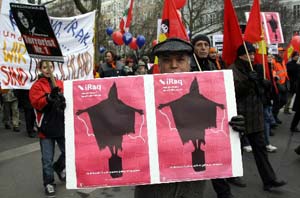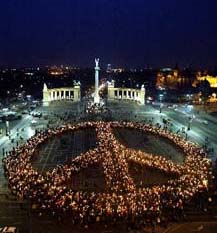| Home / International / International -- Update | Tools: Save | Print | E-mail | Most Read |
| Protests Urge Troop Pullout |
| Adjust font size: |
A wave of protests took place around the world over the weekend to mark the third anniversary of the US invasion of Iraq and demand the withdrawal of foreign troops from the country. In Tokyo, about 800 demonstrators took to the streets for the second day, after some 2,000 protested on Saturday. "The Iraq war was President Bush's big mistake and the whole world is against him," said Ayako Nishimura, 66, who is a city council member from the Tokyo suburb of Sagamihara and organized Sunday's protest. "Iraq must decide its own affairs." The demonstrations started on Saturday with 500 people chanting anti-war slogans in Sydney and rolled around the world, with major protests in London and the United States, where more than 1,000 people gathered in New York's Times Square. However, attendance at the demonstrations was lower than organizers had predicted, and far short of the millions worldwide who protested the initial invasion in March 2003. In Asia, a variety of factors appeared to distract people in the southern Australian city of Melbourne, which saw some of Australia's biggest anti-war protests three years ago, attention has been diverted by the Commonwealth Games. In South Korea, it was a baseball match. At least 1,000 activists rallied in Seoul Sunday to condemn the US-led invasion of Iraq and to urge the government to bring their troops home. The anti-war demonstration was a stark contrast to a crowd of some 10,000 baseball fans who turned out in a street rally a few blocks away to cheer and watch their national team on an outdoor screen as it played Japan in a semi-final match of the inaugural World Baseball Classic in San Diego. Protesters in Chicago marched down Michigan Avenue to a Saturday night rally at Daley Plaza downtown. Police estimated that more than 7,000 people took part. In London, police said a march from Parliament to a rally in Trafalgar Square on Saturday drew about 15,000 people, far fewer than the 100,000 that organizers had expected.
(China Daily March 20, 2006)
|
| Tools: Save | Print | E-mail | Most Read |
 |
| Related Stories |

